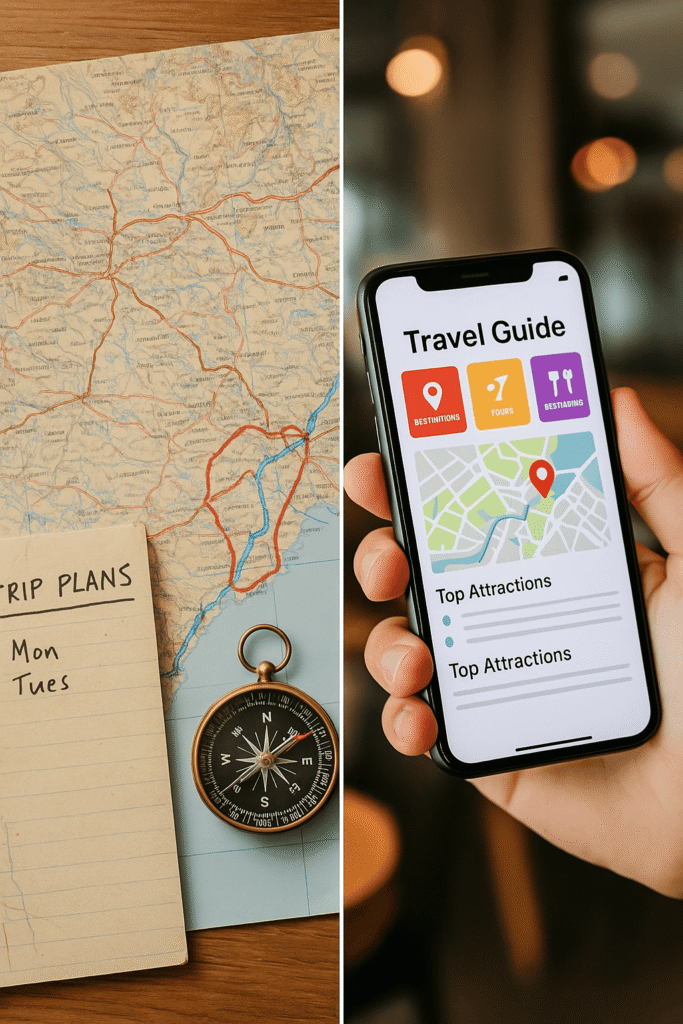The moment I stumbled upon a hidden waterfall in Bali—one that wasn’t mentioned in any mainstream guidebook—I realized the true power of quality travel guide websites. A local travel blogger had shared this secret gem on a community-driven platform, complete with detailed directions and the best time to visit for golden hour photography. That magical discovery, shared by a fellow traveler through digital word-of-mouth, changed how I approach trip planning forever.
In today’s overwhelming digital landscape, finding trustworthy travel guide websites feels like searching for a needle in a haystack. With countless platforms promising the “best” recommendations, how do you separate authentic insights from generic, SEO-stuffed content? After spending five years exploring remote corners of 40+ countries and testing virtually every major travel platform, I’ve learned that the right travel guide websites don’t just provide information—they unlock experiences you never knew existed.

Why Quality Travel Guide Websites Matter More Than Ever
The digital travel landscape has exploded with options, but not all travel guide websites are created equal. In today’s information-saturated world, discerning travelers need platforms that offer more than just generic destination lists—they need comprehensive resources that understand their unique travel style and provide actionable, up-to-date insights.
The best travel guide websites combine expert editorial content with real traveler experiences, offering everything from detailed city guides to insider tips that you won’t find in traditional guidebooks. They’ve evolved from simple information repositories into dynamic platforms that help you discover, plan, and book your entire journey seamlessly.
Top-Tier Travel Guide Websites for Every Type of Traveler
Comprehensive Destination Guides
Lonely Planet remains the gold standard among travel guide websites, offering unparalleled depth in destination coverage. Their expert writers live and breathe travel, providing detailed insights into culture, cuisine, and must-see attractions. What sets Lonely Planet apart is their commitment to sustainable and responsible travel, making it perfect for conscious travelers seeking authentic experiences.
Rick Steves has built his reputation on European travel expertise, but his travel guide websites now cover destinations worldwide. His practical, budget-conscious approach resonates particularly well with first-time international travelers and those seeking cultural immersion over luxury experiences.
Family-Focused Travel Resources
Traveling with children requires specialized knowledge that general travel guide websites often overlook. Family Vacation Critic (part of the TripAdvisor family) specifically caters to families, offering age-appropriate activity recommendations, family-friendly hotel reviews, and practical tips for traveling with kids of all ages.
Trekaroo stands out among family-oriented travel guide websites by crowdsourcing reviews from real parents. Their detailed insights into everything from airline policies for car seats to the best beaches for toddlers make family trip planning significantly easier.

Solo Travel Specialists
Solo travelers have unique needs and concerns that mainstream travel guide websites don’t always address. Nomadic Matt offers comprehensive guides specifically tailored to budget-conscious solo travelers, with detailed budget breakdowns, safety tips, and strategies for meeting fellow travelers.
Solo Traveler focuses exclusively on the solo travel niche, providing destination guides through the lens of the independent traveler. Their safety-focused content and community features make them invaluable resources for first-time solo adventurers.
Couple and Romance Travel
Romantic Travel specializes in creating magical experiences for couples, offering everything from intimate restaurant recommendations to secluded beach destinations. Their travel guide websites feature detailed romantic itineraries and special occasion planning tips that generic platforms simply can’t match.
Digital Innovation in Travel Guide Websites
Modern travel guide websites leverage technology to enhance the user experience dramatically. Interactive maps, real-time weather updates, and mobile-optimized content ensure that valuable information is always at your fingertips. Many platforms now integrate booking capabilities, allowing you to seamlessly transition from inspiration to reservation.
Artificial intelligence and machine learning have revolutionized how travel guide websites deliver personalized recommendations. Platforms like TripAdvisor and Expedia use sophisticated algorithms to suggest destinations and experiences based on your travel history and preferences.

Booking Integration and Practical Planning
The most effective travel guide websites seamlessly blend inspiration with practical booking capabilities. Booking.com has evolved beyond simple accommodation reservations to include comprehensive destination guides, local experiences, and transportation options. Their integration of user reviews with detailed city guides creates a powerful planning ecosystem.
Expedia combines their extensive booking platform with editorial content, offering travelers the ability to research, plan, and book their entire trip within a single ecosystem. This integration saves time and often results in better deals through package bookings.
Emerging Trends in Travel Guide Websites
Video content is increasingly important in travel guide websites, with platforms incorporating virtual tours, local video guides, and live-streamed experiences. This multimedia approach helps travelers make more informed decisions and builds excitement for upcoming trips.
Sustainability consciousness is driving changes in how travel guide websites present information. Platforms are increasingly highlighting eco-friendly accommodations, carbon-neutral transportation options, and responsible tourism practices.

Making the Most of Travel Guide Websites
To maximize the value of travel guide websites, approach your research systematically. Start with comprehensive platforms like Lonely Planet for destination overview, then dive into specialized sites based on your travel style. Cross-reference information across multiple travel guide websites to ensure accuracy and get diverse perspectives.
Don’t overlook the comment sections and community features of travel guide websites. Real traveler insights often provide the most valuable and current information, especially regarding recent changes or hidden gems that haven’t made it into official guides yet.
Conclusion: Your Journey Starts Here
The right travel guide websites can transform your trip from good to extraordinary. Whether you’re planning a solo adventure through Southeast Asia, a romantic European getaway, or a multi-generational family reunion, these carefully curated platforms provide the insights, inspiration, and practical tools needed to create unforgettable memories.
Remember, the best travel guide websites are those that align with your specific travel style and preferences. Take time to explore different platforms, bookmark your favorites, and don’t be afraid to combine insights from multiple sources. Your perfect trip is just a few clicks away.
Frequently Asked Questions
Q: How do I know if travel guide websites have current information? A: Look for recent publication dates, active comment sections with recent posts, and websites that regularly update their content. The best travel guide websites will clearly display when articles were last updated and actively moderate their community sections.
Q: Are free travel guide websites as reliable as paid subscription services? A: Many free travel guide websites offer excellent quality content, particularly those supported by advertising revenue from reputable travel companies. However, paid services often provide more detailed, ad-free experiences and exclusive content. Evaluate based on your specific needs and budget.
Q: Which travel guide websites work best for last-minute trip planning? A: Platforms that combine real-time booking with destination guides, such as Booking.com and Expedia, excel for last-minute planning. They offer immediate availability information alongside travel insights, making them ideal when time is limited.
Q: How can I use travel guide websites to find off-the-beaten-path destinations? A: Look for travel guide websites with strong community features where experienced travelers share lesser-known discoveries. Platforms like Atlas Obscura specialize in unusual destinations, while general sites often have “hidden gems” sections contributed by local experts and seasoned travelers.
Ready to start planning your next adventure? Subscribe to our newsletter for weekly travel inspiration, exclusive destination guides, and insider tips that you won’t find anywhere else. Join our community of passionate travelers and never miss out on the perfect trip opportunity again!







